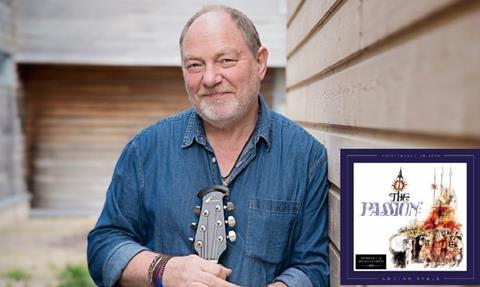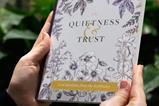As the best-selling Christian album of the 1980s is remixed and re-released, Tony Cummings shares the inside story of how Adrian Snell worked with the Royal Philharmonic Orchestra to deliver a “symphonic rock classic”

It was the British, not the American Church which first spotted the potential of wedding post-rock n roll popular music styles to the Gospel message.
With little or no financial investment from the Church establishment or older Christians, this movement slowly but surely grew from beach missions and coffee bars to concerts at the Royal Albert Hall.
In March 1958 the Daily Mirror was writing about The Venturers, a skiffle band formed at Spurgeon’s Bible College, with the headline ‘Dig These Hep Cat Preachers!’ In February 1964 guitar-toting Salvationists the Joystrings made the lower reaches of the UK pop charts. And in October 1965 a homemade 200-circulation magazine, Buzz, had sprung up to report on evangelist beat groups. The mag was created by Musical Gospel Outreach (MGO) but see here for how it went on to become Premier Christianity magazine.
By the 1970s Britain’s Christian bookshop world had begun to realise that staid choirs and George Beverly Shea crooning hymns had no appeal to young Christians looking for musical edification.
The early years
Blissfully unaware of all this was Adrian Snell, the son of an Anglican minister who was confirmed at Canterbury Cathedral and was attending the city’s public school. Adrian had developed piano skills and by 1972 had enrolled at the Leeds College of Music studying jazz, switching in 1974 to classical music studies. As he said, “When I went to college I went with the desire that one day my path in life would be as a performer and as a recording artist.”
While still at college Snell began to play concerts and was invited to perform at Newcastle University. At the gig he met Malcolm & Alwyn, the acoustic duo whose music was making an impact across British churches. Snell told the duo’s Malcolm Wild that he was looking for a record company who would get behind him as a performer. Malcolm & Alwyn recommended that he “stay within the family” and sign with MGO. Snell didn’t consider himself a musical evangelist. He had dreams of recording classically influenced progressive rock albums. But at least Key Records were getting their albums recorded and into the shops… if only Christian bookstores.
After much deliberation Snell signed with the small-time outfit. His debut album Fireflake was recorded on an absurdly tiny budget and sold 3,000 or so. With MGO’s connections, Adrian began playing gigs here, there and everywhere.
“My first ever serious tour was organised by MGO after the release of Fireflake. It was an incredible hotchpotch, from colleges and universities to youth groups and church halls. They were the headband days. They were a shock to people; what on earth was this guy turning up with long hair and a headband with a little ‘peace’ sign at the front!”
From small sales to stardom
More albums followed. But it was an MGO organised multi-artist event at the Albert Hall which was to eventually lead to an escape route from the small sales/small recording budgets which was stopping UK artists from developing like America’s large church music market acts.
Handling the PA at the Albert Hall was Jon Miller. Miller was part of a production company Triumvirate, and was impressed with Snell’s performance. He asked Key’s Geoff Shearn whether Triumvirate could be involved in producing the next Snell album. In 1979 Snell’s Something New Under The Sun was released through a new company, Kingsway Music. Triumvirate brought in top secular session musicians as well as a professional string section and backing singers. The whole thing shone with tight, bright musicianship. It became Snell’s best-selling album so far. But there were much, much bigger things ahead for the singer/pianist.
The visionary Miller had been listening to the suite of Easter-themed songs The Passion which made up side two of Snell’s Fireflake. Snell remembered, “The response to them in concert was very deep. Many times with audiences I felt we’d gone somewhere very special together…”
Miller came up with a stunning proposal. “Jon said, ‘Don’t just re-record The Passion but expand it [with additional songs] and let’s go the whole route and make it a rock oratorio – invite personalities to sing the songs and all the rest of it… Let’s get a top orchestra… I think we should approach the Royal Philharmonic…’ My heart leapt. For an artist with a classical rock background this was fantasy language. I certainly didn’t think it would happen. But then I thought, if anybody could pull it off, with his contacts this guy could. It all moved very fast. [New songs were written.] I did piano and voice demos [of the old and new songs]. And Jon Miller sent the material to one of the managers of the Royal Philharmonic Orchestra… They came back and said for this sum they could provide this number of the orchestra. Suddenly there it was on paper, we could do it.”
No expense was spared in the rhythm section hired to lay down the rock tracks with Snell. Triumvirate brought in 18 year old drummer Simon Phillips - one of the best in the business.
“If ever the phrase ‘mind blown’ applied to a musician, it applied to me,” remembers Snell. “I remember recording pieces like ‘Judas Song’ and ‘Golgotha’ and being absolutely astonished by what I heard going on around me. I remember coming back into the control room and listening back to it and being staggered.”
The arranger chosen to write the charts for the Royal Philharmonic was Will Malone, a much respected figure who’d worked with Rick Wakeman. The day of recording the orchestra will stay forever in Snell’s memory. “It was one of the most precious moments of my musical life being in the Olympic Studios, London, up in the control room looking down upon members of the Royal Philharmonic Orchestra playing my music. Harry Rubinowitz was the conductor, he was absolutely brilliant and even the fact that half of the orchestra were reading the daily newspaper in between takes didn’t worry me too much.”
I remember listening back to it and being staggered
The performances of the singers booked to play the different characters in supporting Adrian singing the role of Jesus helped bring out the full dramatic power of the original five songs and the newly written ones. The hauntingly reflective Snell solo ‘Gethsemane’ (“The nails are sharp and cruel my Lord / O save me from a cross of wood / For I am so afraid”) and the uplifting closer ‘Peace Be With You’ (“Life so full I give to you / As my Father sends me so I send you / Spread my light throughout all life”) were compelling Snell performances while the up tempo works ‘Judas Song’ featuring a sorrowful vocal from Mark Williamson and the tumultuousness instrumental ‘Golgotha’ stand comparison with the best symphonic rock in the mainstream.
As much attention to The Passion’s sleeve as to the music was also hearteningly given. Striking original watercolour paintings by esteemed artist Eugene Press were a perfect visual dimension to the evocative musical exploration of those momentous Easter events. The completed album was a hugely impressive artifact.
A string of accolades
The Passion had its world premiere at Eastbourne Winter Gardens. Then on Good Friday, BBC Radio 1 broadcast the whole rock oratorio to an audience of millions. If the music world was fair, the album’s quality should have elevated Snell to crossover to stardom. But the major labels/distributors showed no interest in putting a “religious” album into standard record shops. Kingsway had to rely on Christian bookshop sales to begin to claw back the major expenditure laid out to make the album. A tour with cast members and orchestra was organised but that was suddenly plunged into controversy when it was discovered that some of the cast were not in fact Christians. Stern denouncements were made by conservative evangelicals and some concerts were cancelled.
But despite the display of evangelical intransigence, nothing could hold back the accolades that ‘The Passion’ began to receive. Sales across Britain’s bookshops were excellent. Thames TV screened the rock oratorio in 1983 and one critic called it “a symphonic rock classic.” The album stayed in catalogue throughout the 1980s, becoming the best-selling Christian music album of the era.
Now in 2024 The Passion is gaining a new audience and reestablishing a connection with its original one.
The original 24 track analogue master tapes have been fully digitalized enabling a completely new mix and digital remastering. The man responsible for this stunning improvement of The Passion is Adrian’s son Jamie Snell whose recent credits include work with pop luminaries Dua Lipa, Paloma Faith and NAO. Jamie was born in the same year The Passion was originally released.
The Anniversary Edition of the album demonstrates once more that even in an age of transitory trends, ever changing musical styles and streaming fixation, a musical masterpiece on the theme of the most important events in human history has the ability to find a place in people’s homes and hearts.
The Anniversary Edition of The Passion is out now and available to buy on CD here





































No comments yet